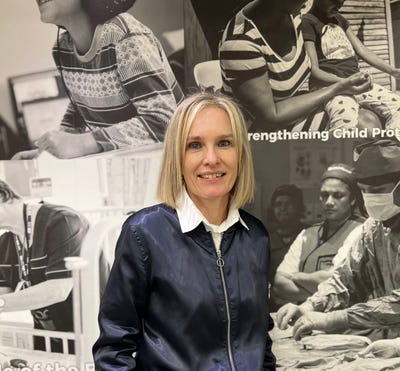Collaborative model to strengthen Africa’s child health systems
Philanthropic finance may help de-risk and mobilise private investment in sustainable development.

Despite progress made during the era of Millennium Development Goals (MDG), Africa is still plagued by poor health outcomes, a lack of infrastructure, and crippling inequalities. Sub-Saharan Africa continues to have the highest under-five mortality rate in the world, making the SDGs’ target of an under-five mortality rate of below 25 per 1,000 live births elusive. African countries with fragile health systems and inadequate infrastructure urgently require investment in the healthcare sector to make progress possible; however, their unique challenges necessitate innovative funding solutions.
According to the Africa Centres for Disease Control and Prevention, the continent’s healthcare sector has experienced a 70 per cent decline in Official Development funding between 2021 and 2025. Africa CDC calls for strengthened government commitments and innovative financing models that rely on forging and strengthening partnerships to facilitate the pooling of resources and improving healthcare service delivery.
A notable example of the capabilities of these partnerships is the three-decade collaboration between the Children’s Hospital Trust and the Western Cape Department of Health and Wellness in South Africa.
The Children’s Hospital Trust was founded in 1994 by Professor David Beatty, then Head of Child Public Health at the University of Cape Town. Faced with declining resources at the Red Cross War Memorial Children’s Hospital (RCWMCH), Professor Beatty established the first formal collaborative partnership between a non-profit organisation and the Western Cape Department of Health.
Since its inception, the Trust has raised funds from diverse private donors to support the construction of infrastructure, procurement of medical equipment, and provision of specialist training, initially at the RCWMCH in Cape Town. This model has since been replicated at each of the Western Cape’s tertiary hospitals, in the Groote Schuur Trust and the Tygerberg Children’s Trust.
The Children’s Hospital Trust responded to critical gaps identified by the Western Cape government in provincial child health services, entering a new chapter and expanding its support to the RCMWCH’s rural and urban referral hospitals. By equipping these facilities with the necessary resources, the Trust, in collaboration with government and higher education institutions, is strengthening the child health system to ensure that children receive quality care close to home.
The partnership between the Children’s Hospital Trust and the Western Cape Government operates on a principle of shared responsibility. The Western Cape Department of Health and Wellness provides operational funding to cover staffing, medicines, consumables, and utilities. This guarantees that donor-funded infrastructure, equipment, and training are fully integrated into the public health system, rather than running as parallel services.
This structure can best be described as a form of blended finance, where concessional public or, in this case, philanthropic finance is used to de-risk and mobilise private investment in sustainable development. While the Trust’s model does not perfectly fit the conventional definition, it applies the same principle of combining resources from diverse stakeholders to achieve outcomes that no single entity could achieve on its own. Private donors provide catalytic capital, funding infrastructure, equipment, and skills development.
Together, the stakeholders form a financing ecosystem governed by a Memorandum of Agreement and built on trust, transparency, and accountability, with a shared commitment to equitable, person-centred child healthcare. The model demonstrates that non-profits can act as catalytic partners, mobilising additional finance and investing it into healthcare systems, and as trusted custodians of financial resources, where trust in governmental entities has been eroded.
This approach reflects a growing African movement toward collaborative resource mobilisation. With global shifts, including geopolitical instability and shrinking aid flows, Africa urgently needs financing models that are locally anchored, sustainable, agile, and scalable.
The vision of the Children’s Hospital Trust is to scale a model of collaboration that saves lives. The impact of our guidance is already evident. One example is Dr. Fenny Shidhika, a Paediatric and Congenital Cardiologist and alumnus of the African Paediatric Fellowship Programme. Now based at Windhoek Central Hospital in Namibia, Dr. Shidhika founded the Namibia National Children’s Heart Trust in 2023. Her organisation acts as a conduit, mobilising resources to support the Ministry of Health and Social Services, ensuring that children with congenital heart disease receive affordable and sustainable care locally. This initiative is already saving lives.
Similarly, colleagues at Muhimbili Hospital in Dar Es Salaam, Tanzania are exploring the creation of a trust to channel resources into the public health system, directly inspired by the Children’s Hospital Trust. These developments underscore the potential of blended financing partnerships to generate ripple effects across Africa, thereby strengthening health systems and clinical capacity, and ensuring that children have access to quality healthcare.
The Children’s Hospital Trust model demonstrates how collaborations between governments, non-profits, and private donors can transform fragile healthcare systems. Africa cannot afford to wait for external aid. By embracing innovative, collaborative financing models that are locally driven and globally connected, we can ensure that no child is denied quality care because of where they are born.
Africa calling! Meet innovative strategists, network with like-minded business leaders, and learn more about the latest healthcare trends and innovations at WHX Cape Town. Sign up now to secure your spot today!

WHX Cape Town
Oct 13, 2026 TO Oct 15, 2026
|Cape Town, South Africa
Join us at WHX Cape Town—where a trusted legacy meets the future of healthcare. WHX Cape Town brings together local talent and global pioneers to explore breakthrough innovations, build transformative partnerships, and shape the future of care from a region rich in ideas and opportunity.



